Intel Xeon Gold 5117 Benchmarks
For this exercise, we are using our legacy Linux-Bench scripts which help us see cross-platform “least common denominator” results we have been using for years as well as several results from our updated Linux-Bench2 scripts. At this point, our benchmarking sessions take days to run and we are generating well over a thousand data points. We are also running workloads for software companies that want to see how their software works on the latest hardware. As a result, this is a small sample of the data we are collecting and can share publicly. Our position is always that we are happy to provide some free data but we also have services to let companies run their own workloads in our lab, such as with our DemoEval service. What we do provide is an extremely controlled environment where we know every step is exactly the same and each run is done in a real-world data center, not a test bench.
We also wanted to note that our dataset is focused on pre-Spectre and Meltdown results at this point. Starting with our Ubuntu 18.04 generation of results we will have comparison points to the new reality. The Spectre and Meltdown patches to hurt Intel’s performance in many tests. At the same time, as of writing this article, patches are still being worked on. Likewise, software is being tuned to deal with the impacts of the patches. Given this, we are going to give the ecosystem some time to settle before publishing new numbers.
Python Linux 4.4.2 Kernel Compile Benchmark
This is one of the most requested benchmarks for STH over the past few years. The task was simple, we have a standard configuration file, the Linux 4.4.2 kernel from kernel.org, and make the standard auto-generated configuration utilizing every thread in the system. We are expressing results in terms of compiles per hour to make the results easier to read.
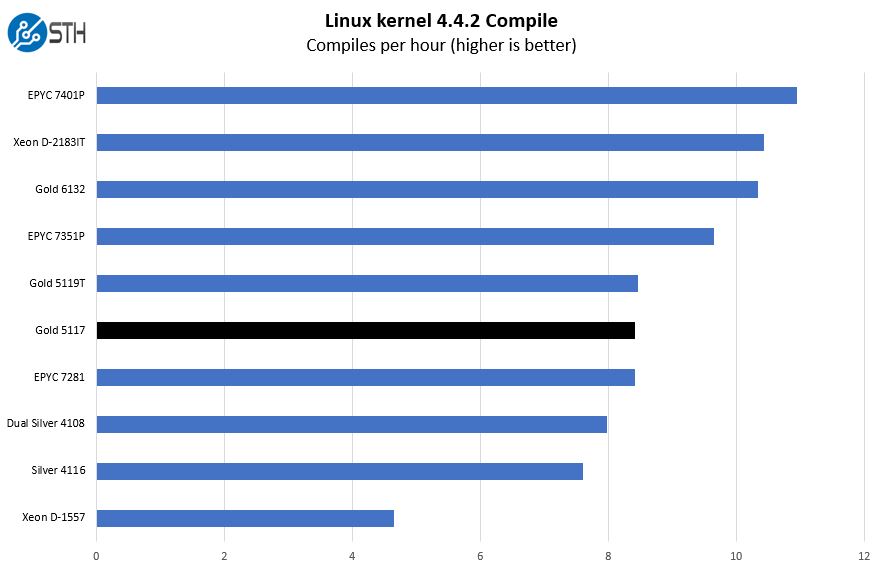
Here we have a few interesting data points. First, from a pure price/ performance perspective, the Intel Xeon Gold 5117 is not competitive with the cheaper AMD EPYC 7401P. If you need raw CPU performance, get the AMD EPYC 7401P and use the savings on additional RAM. In this segment of the market, Intel is not price/ performance competitive versus AMD. As a result, we are going to focus most of our discussion on the Intel Xeon Scalable parts.
c-ray 1.1 Performance
We have been using c-ray for our performance testing for years now. It is a ray tracing benchmark that is extremely popular to show differences in processors under multi-threaded workloads. We are using our new Linux-Bench2 8K render to show differences.
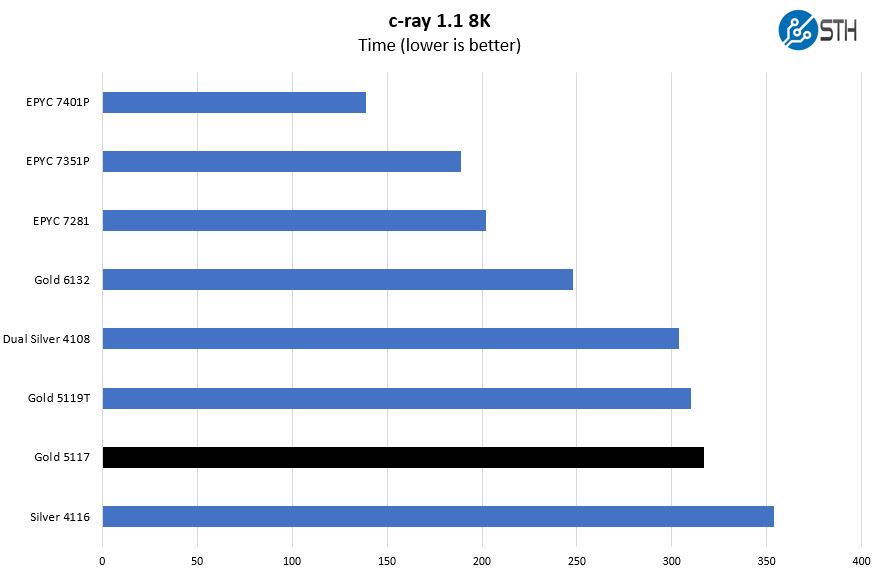
We are going to widdle down the comparison set a bit in our subsequent charts. Still, we are looking at four data points here. The Intel Xeon Silver 4116 is a lower cost SKU with higher clock speeds but fewer cores. The Intel Xeon Gold 5119T has a lower base and higher turbo clock but a vastly lower TDP. We also wanted to look at dual Intel Xeon Silver 4108 CPUs. If you are looking at a single socket Intel Xeon Gold 5117 CPU, the Intel Xeon Silver 4108 dual configuration will be less expensive, support for more memory, and run in about the same power envelope.
7-zip Compression Performance
7-zip is a widely used compression/ decompression program that works cross-platform. We started using the program during our early days with Windows testing. It is now part of Linux-Bench.
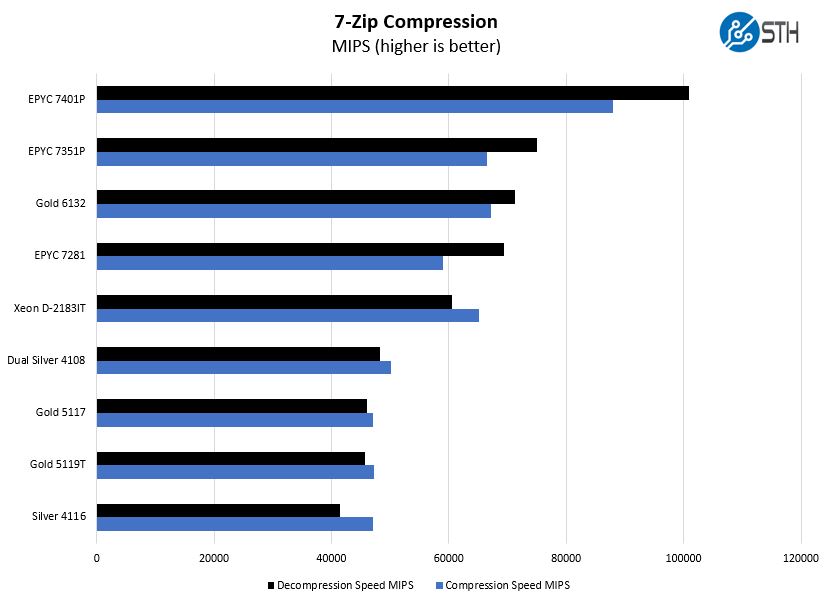
Here one can see that the overall performance slightly outpaces the Intel Xeon Gold 5119T. At the same time, even embedded high-end parts like the 16-core Intel Xeon D-2183IT far outpace the Xeon Gold 5117.
NAMD Performance
NAMD is a molecular modeling benchmark developed by the Theoretical and Computational Biophysics Group in the Beckman Institute for Advanced Science and Technology at the University of Illinois at Urbana-Champaign. More information on the benchmark can be found here. We are going to augment this with GROMACS in the next-generation Linux-Bench in the near future. With GROMACS we have been working hard to support Intel’s Skylake AVX-512 and AVX2 supporting AMD Zen architecture. Here are the comparison results for the legacy data set:
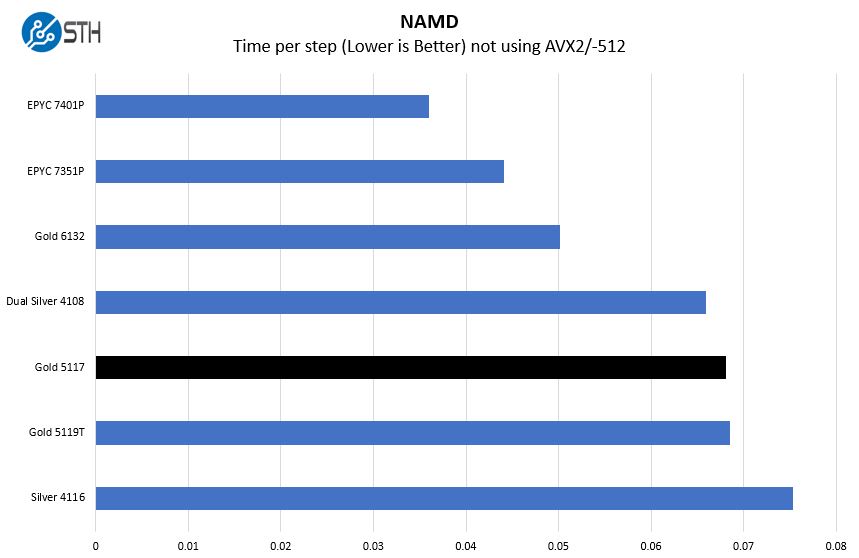
Again, we see a tight grouping of the four main Intel Xeon Scalable CPUs in our comparison set. The Xeon Silver 4116 is consistently slower, but the price premium is more than 50% for what seems to be ~10% performance benefit.
Sysbench CPU test
Sysbench is another one of those widely used Linux benchmarks. We specifically are using the CPU test, not the OLTP test that we use for some storage testing.
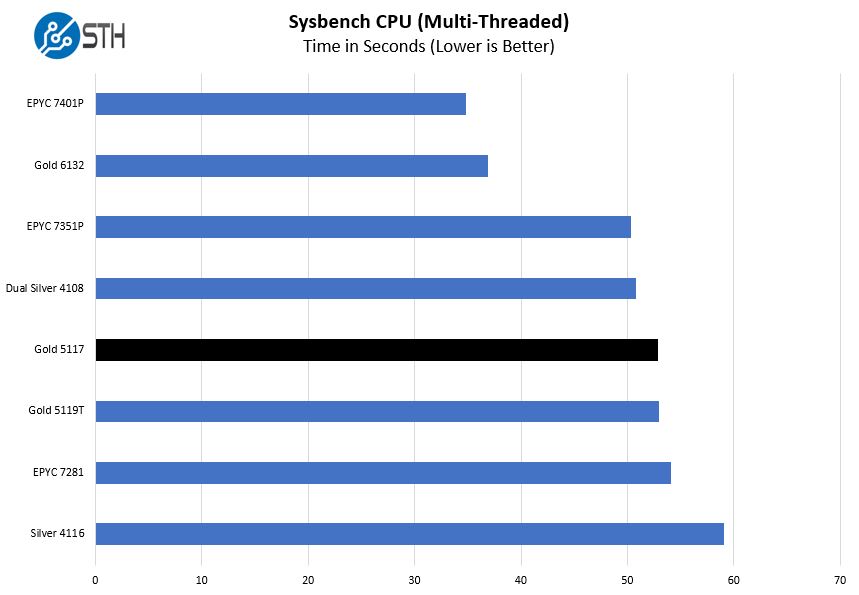
Here we see an interesting chart with the Intel Xeon Gold 5117 pulling ahead of the 16 core AMD EPYC 7281. The AMD EPYC 7281 is a $700 part and the incremental cost upgrade to the AMD EPYC 7351P is worthwhile. You will spend about half on the EPYC 7351P versus the Intel Xeon Gold 5117.
OpenSSL Performance
OpenSSL is widely used to secure communications between servers. This is an important protocol in many server stacks. We first look at our sign tests:
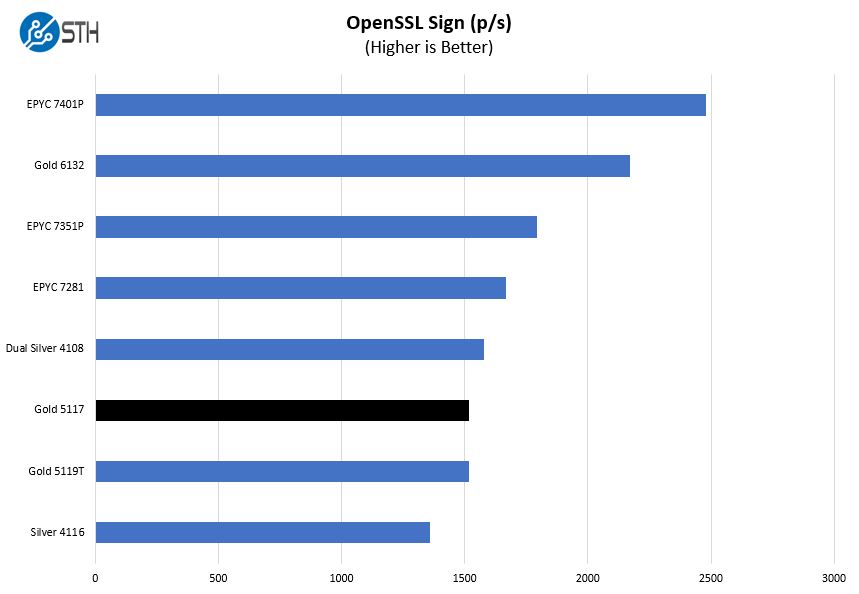
Here are the verify results:
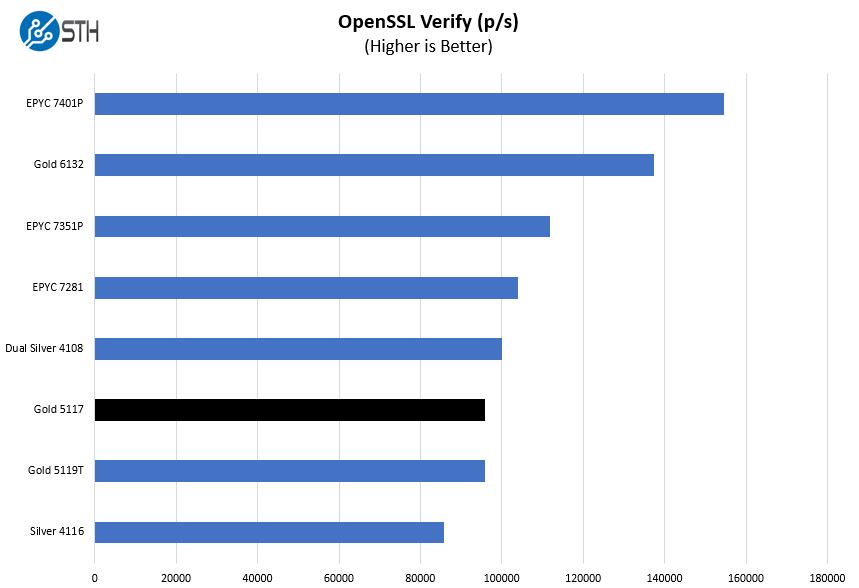
Again we see a virtual dead heat between the Intel Xeon Gold 5117 and the Xeon Gold 5119T. Frankly, in this range, we prefer the dual Intel Xeon Silver 4108 over the single Gold 5117.
UnixBench Dhrystone 2 and Whetstone Benchmarks
Some of the longest-running tests at STH are the venerable UnixBench 5.1.3 Dhrystone 2 and Whetstone results. They are certainly aging, however, we constantly get requests for them, and many angry notes when we leave them out. UnixBench is widely used so we are including it in this data set. Here are the Dhrystone 2 results:
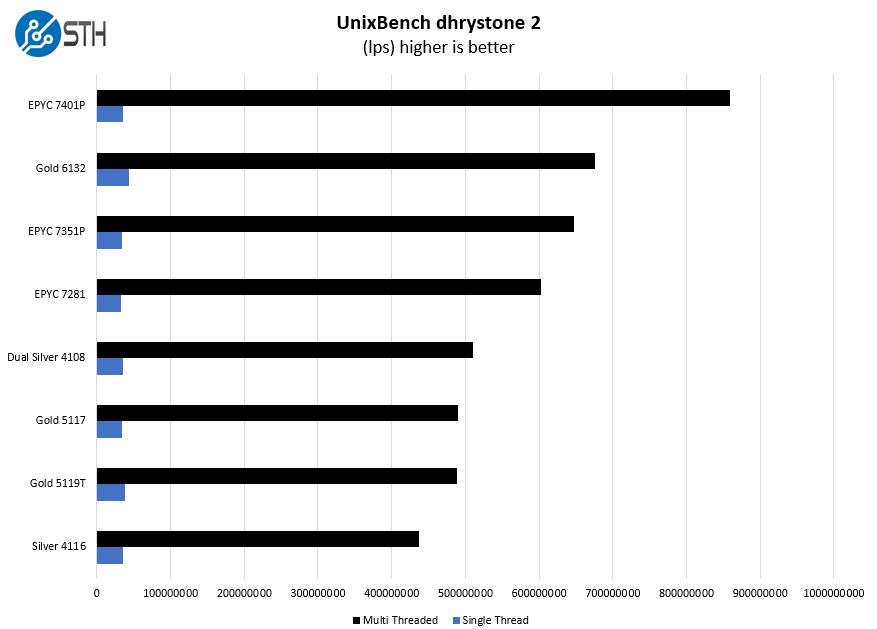
And the whetstone results:
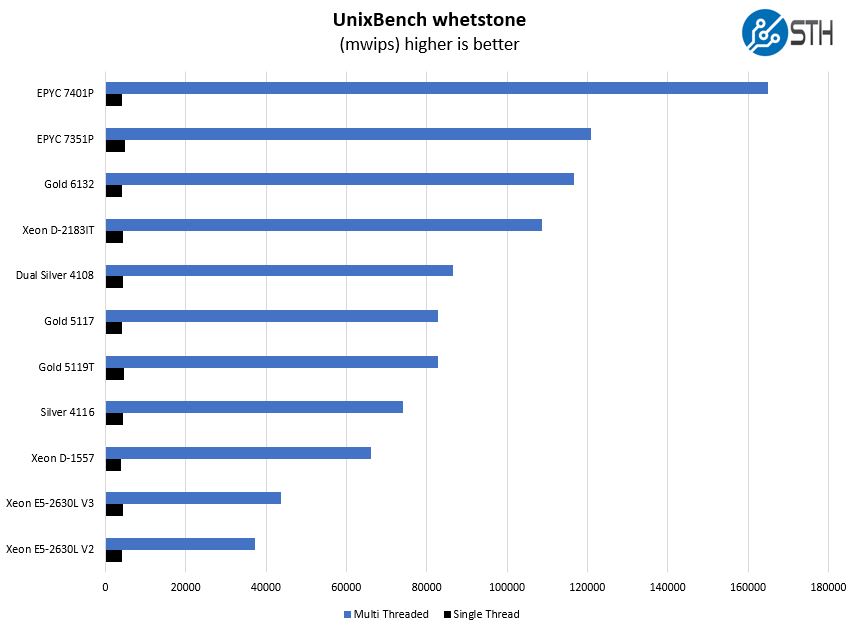
Overall the performance is solidly around the Gold 5119T. Higher end parts like the Xeon D-2100 and the Xeon Gold 6100 simply blow away the Gold 5117.
GROMACS STH Small AVX2/ AVX-512 Enabled
We have a small GROMACS molecule simulation we previewed in the first AMD EPYC 7601 Linux benchmarks piece. In Linux-Bench2 we are using a “small” test for single and dual socket capable machines. Our medium test is more appropriate for higher-end dual and quad socket machines. Our GROMACS test will use the AVX-512 and AVX2 extensions if available.
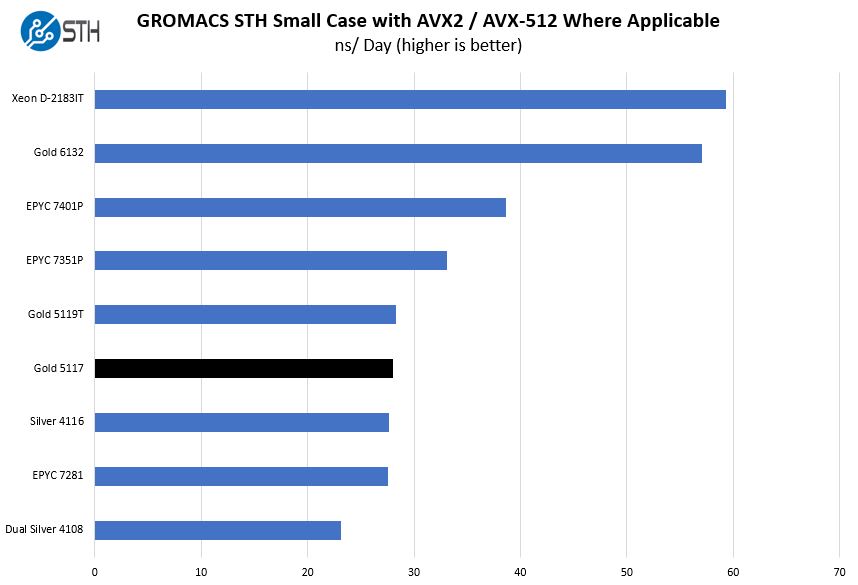
Intel castrates the AVX-512 performance of the Xeon Silver 4100 and Xeon Gold 5100 range. Even with AVX-512, the single port FMA implementation cannot keep up with AMD EPYC at half the price.
Chess Benchmarking
Chess is an interesting use case since it has almost unlimited complexity. Over the years, we have received a number of requests to bring back chess benchmarking. We have been profiling systems and are ready to start sharing results:
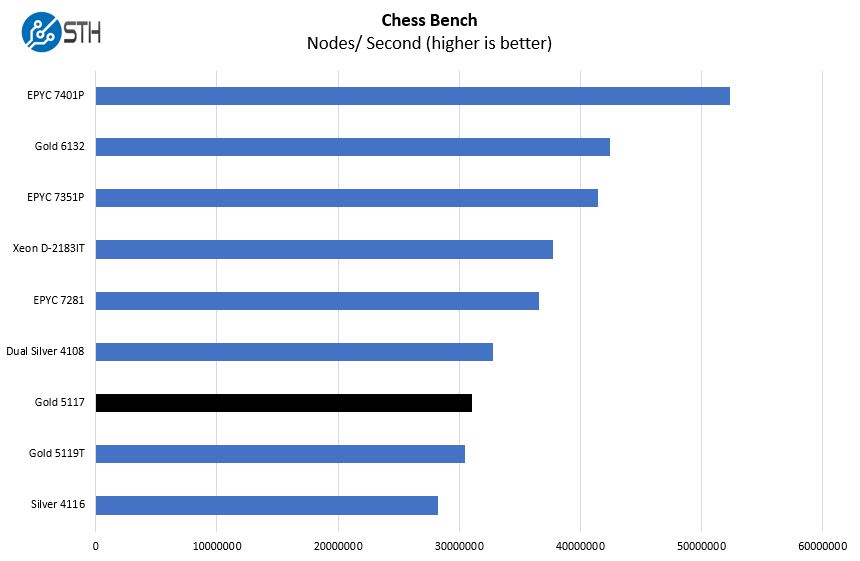
Moving to another computationally expensive benchmark, we see that the Intel Xeon Gold 5117 notches one of its largest performance wins over the Xeon Gold 5119T.
Next, we are going to look at the power consumption of the chip. We are going to follow that with a discussion of the chip in relation to other chips in the market. We will end with our final thoughts on the chips.




Nobody ever got fired for buying Xeon…until now 🙂
Who is buying these?